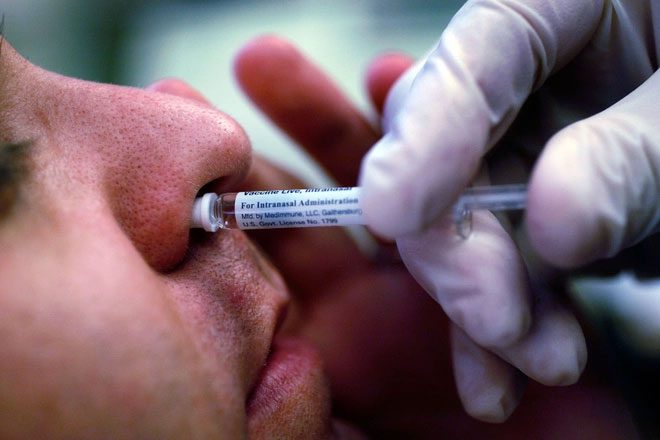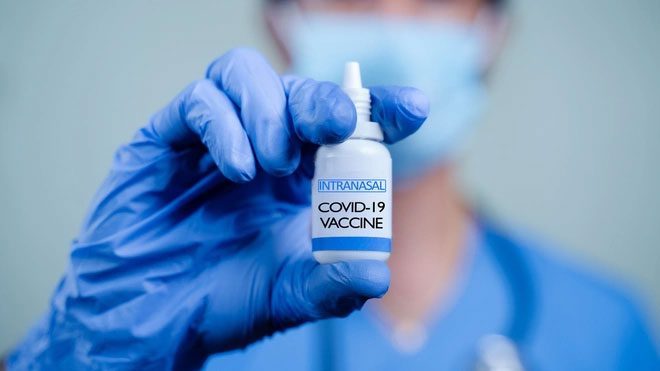Researchers are developing a nasal Covid-19 vaccine, which alleviates the pressure for those afraid of needles.
So far, all approved Covid-19 vaccines have been administered via injection, typically into the arm. Currently, two companies are planning to change that by developing nasal Covid-19 vaccines.
According to Medical News Today, CanSino Biologics, a Chinese pharmaceutical company, has recently received approval from the National Medical Products Administration of China for Convidecia Air, their recombinant vaccine delivered through the respiratory system in the form of a nasal spray.
Additionally, Bharat Biotech International, a biotechnology company based in India, has received approval from the Restricted Use in Emergency Situations (India) for iNCOVACC, a recombinant vaccine administered nasally as nasal drops.
What is a Nasal Vaccine?
The most common way to administer a vaccine is through injection. However, this is not the first time scientists have developed a nasal vaccine. The most widely known nasal vaccines today are for influenza.
Scientists are also researching nasal vaccines for other diseases, including whooping cough, hepatitis B, and the virus causing African swine fever.
Some researchers believe that delivering vaccines nasally allows them to directly enter the mucous membranes of the body. The mucosa, or mucous membrane, is the moist layer inside body cavities such as the nose and mouth. The glands in the mucosa are responsible for producing mucus.
The mucosa is a crucial part of the body’s immune system. When a person breathes, the mucosa helps prevent bacteria and other harmful particles from entering the body.
The mucosa also absorbs certain pathogens. Because the nose connects to the respiratory system, this helps the nasal vaccine move easily throughout the body.
Moreover, nasal vaccines help reduce anxiety for those who fear needles. Experts estimate that 1 in 4 adults and 2 in 3 children are afraid of vaccinations. And 1 in 10 people skip getting the Covid-19 vaccine due to needle phobia.

The nasal Covid-19 vaccine will reduce the fear of needles. (Photo: Joe Raedle).
Research on Nasal Covid-19 Vaccines
Both Convidecia Air from CanSino Biologics and iNCOVACC from Bharat Biotech International Limited are recombinant vaccines.
This means they use a protein from the SARS-CoV-2 virus in the vaccine. When the vaccine enters the body, the protein binds to cells, triggering an immune response.
Both nasal vaccines also utilize adenovirus vector technology. Adenovirus vectors are genetically modified viruses previously used in gene therapy.
Researchers have also conducted studies on using adenovirus vectors as a vaccine platform for other diseases, including HIV-1, Ebola, and many other infectious diseases.
According to statements on CanSino Biologics’ website, Convidecia Air uses a similar adenovirus vector technology platform as Convidecia, the company’s Covid-19 vaccine.
Convidecia recently received an emergency use listing from the World Health Organization (WHO). Phase 3 clinical trial results for Convidecia showed an efficacy rate of 57.5% against SARS-CoV-2 infection.
Meanwhile, Bharat Biotech’s nasal vaccine iNCOVACC was developed in collaboration with Washington University in St. Louis. This nasal vaccine also recorded “successful results” after Phase 1, 2, and 3 clinical trials.

Not only China and India, but many other countries are also researching nasal vaccines. (Photo: Deccanherald).
The Future of Nasal Covid-19 Vaccines
Although these are the first two nasal Covid-19 vaccines to receive approval, many others are being developed.
For example, a group of microbiologists at Mount Sinai (USA) is also developing a nasal Covid-19 vaccine. It has completed Phase 1 and 2 trials in Thailand, Brazil, Mexico, and Vietnam, with a recent Phase 1 trial launched at Mount Sinai.
According to Mount Sinai media, this new vaccine is one where the virus is cultured in eggs. It uses the Newcastle disease virus (NDV).
In March, the University of Oxford reported on conducting Phase 1 clinical trials testing the delivery of a nasal Covid-19 vaccine. This trial is in collaboration with AstraZeneca.
And in May, Codagenix, a US-based vaccine development company, announced the start of Phase 1 clinical trials for CoviLiv, their nasal Covid-19 vaccine.
Benefits of Nasal Vaccines
Fady Youssef, a pulmonary specialist, internal medicine physician, and critical care expert at MemorialCare Long Beach Medical Center (California, USA), shared with Medical News Today about these new nasal vaccines and their benefits.
“I think it’s great to have different options for patients to choose whatever they feel most comfortable with,” he said.
When nasal Covid-19 vaccines become available, Dr. Youssef recommends that people consult their doctors to ensure that it’s the right vaccine delivery system for them.
He warns: “Some patients may have had nasal surgery, sinus issues, or nasal polyps. Therefore, this may not be the best option for them.”
Peter Palese, Horace W. Goldsmith Professor and Chair of the Department of Microbiology at the Icahn School of Medicine at Mount Sinai, noted that while mRNA vaccines against SARS-CoV-2, such as those from Pfizer and Moderna, are effective in reducing infection rates and the severity of disease, multiple doses of existing vaccines do not prevent the development of infections and are less effective in eliminating person-to-person transmission.
He emphasized: “Thus, nasal vaccines that induce mucosal immunity should show improvements in infection and disease spread.”
Dr. Palese stated: “The approval of such vaccines in China and India by CanSino Biologics and Bharat Biotech represents a significant step forward for effective mucosal Covid-19 vaccines.”


















































